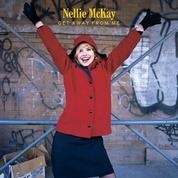
| CD Reviews: Nellie McKay | ||
She's been called the next Norah Jones. Or the next Jane Monheit. Or a cross between Doris Day and Eminem. But she is none of those things. Nellie McKay defies genre. To be fair, her sensibility is certainly that of a cabaret/jazz/theatrical sort of sound, which seems to fit, given her background playing in piano bars before starting to write her own original material about a year ago. However, although the cabaret sound is the voice in which this songwriter speaks, she makes little attempt to write songs which, in structure or content, fit within the conventions of any particular genre--- unless, of course, she writes within a genre only to turn it on its head. Take, for example, Manhattan Avenue. The sound suggests a lush torch song--- the sort which would have been sung by a glamorous character in an escapist wartime film. However, on another listen, the song is just the opposite of escapist--- rather, it is a celebration of her love of a very real New York City neighborhood where she lived as a child. To music which would suggest a very different time and place, Nellie reflects on the scuzzy hue of the sunlight, remarking what a strange vice that a mugger and a child share the same paradise. But Nellie's Manhattan Avenue is her paradise, and rather than question or evaluate or criticize that, she simply sets it to music befitting of a paradise. Get Away From Me is an inherently personal album about a keenly political person. (The album's back cover declares McKay "a proud member of PETA.") There is mention of politics and social issues, to be sure, but these issues are often referenced not to make a political or social comment, but to primarily to portray the psychological experience of being a person with social and political awareness (well, specifically, the experience of being Nellie McKay). For example, the album opens with David, a song about the process of waiting around for the object of one's unrequited affection to respond. The song mentions politics: Mister Bushie says I'm your president, I've got lots to say, hey hey hey, and click goes the remote, there you have my vote, catching the next boat out of here. But the presence of political thought serves chiefly to portray precisely how McKay's mind wanders. And while David sets forth the frustration of unrequited love, Baby Watch Your Back recognizes the humor in it, conjuring sounds reminiscent of a 1960s spy movie and joking about following her crush around while wearing a "wig and funny glasses." Some of the most interesting moments on the album (and there are many interesting moments) are those in which McKay directly reflects upon the emotional burdens of maintaining high personal standards of social responsibility. In Change The World she describes the process of forcing one's self to action: Ring a ding, ding a ling, anything, just do something / Feelin dense, on the fence, civil disobedience. . . / People are dying now, do something you ugly cow. And Inner Peace seems poised between being a scathing criticism of apathy, and a portrayal of an emotionally exhausted activist seeking permission for a break (Don't wanna think about the fall election / Don't wanna sing about no vivisection / I don't need this, I don't see this / All I want is inner peace). McKay's skill with language--- and particularly with rhyme--- is a rarity in popular music. Indeed, the sophistication of her rhyme schemes seems to warrant just comparison to Stephen Sondheim more than to anything on the pop charts. For example, Work Song uses sound and language to evoke the drudgery of monotonous labor. The sharp, punctuating effect of her rhymes is remarkable: So you turn and you toil / And you burn and you boil / In the tourniquet coil / Of the white folks' soil / Spoiling with a malaise / Worse than disses or dope / Waking up in a daze / With your wishes and hopes. Fuelled by pulsing percussion, the phrase captures the essence of exhaustingly repetitive work. This is a double CD, the first of its kind on a debut by a female artist. Eighteen songs take the listener through the weird, wonderful world of McKay's psyche. The album ends with Really, a song whose deceptively contemplative tone suggests that McKay might have a final comment on which to end: Am I sad, not sad enough really / Am I mad, not mad enough clearly. But as the song progresses, it emerges that it is not told from her own point of view, but is a sarcastic criticism of a careless person. McKay won't hand us a final analysis of her work or herself. That work is left to the listener--- and it is truly work worth doing. The album is rich, groundbreaking and multi-layered, and delivers a new level of insight upon listen after listen. This is Nellie McKay at nineteen years old. I cannot wait to see what she does next. |
©2002-2023 SoundAffects.net

